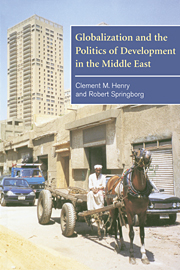Book contents
- Frontmatter
- Contents
- List of figures
- List of tables
- Preface and acknowledgments
- Glossary
- Map. The Middle East and North Africa
- 1 Overview
- 2 The challenges of globalization
- 3 Political capacities and capitalist legacies
- 4 Bunker states
- 5 Bully praetorian states
- 6 Globalizing monarchies
- 7 Fragmented democracies
- 8 Conclusion
- References
- Index
6 - Globalizing monarchies
Published online by Cambridge University Press: 05 June 2012
- Frontmatter
- Contents
- List of figures
- List of tables
- Preface and acknowledgments
- Glossary
- Map. The Middle East and North Africa
- 1 Overview
- 2 The challenges of globalization
- 3 Political capacities and capitalist legacies
- 4 Bunker states
- 5 Bully praetorian states
- 6 Globalizing monarchies
- 7 Fragmented democracies
- 8 Conclusion
- References
- Index
Summary
The monarchies in the region seem better positioned than praetorian republics to take advantage of the opportunities of the globalizing economies. They have more active private sectors, some of which have joint ventures and other constructive relationships with multinational companies, in petroleum-related industries for the most part. Many of them also have concentrated financial systems, discussed in chapter 3, that enable them to engage in a controlled liberalization that fits some of the commandments of the Washington Consensus. However, the monarchies are also politically more vulnerable than the praetorians because they did not undergo the full political transformation of a colonial dialectic. Yet they depend just as much as the other regimes discussed so far in this book on their military and police forces to stay in power – rather than on any deeply rooted traditional legitimacy to which their official propaganda machines lay claim.
Most of them are relics of British imperialism. Britain generally preferred to intervene as little as possible in the internal affairs of its possessions because their prime importance lay in their geographical positions, astride passages to India, not in any intrinsic worth. It was easier to deal with ruling families by anointing them as monarchs than to reorganize their territories as crown colonies. Borders were matters of chance and political opportunity. As colonial secretary in 1921, for instance, Winston Churchill invented Jordan for the sake of one of the sons of the Sharif Hussein of Mecca.
- Type
- Chapter
- Information
- Globalization and the Politics of Development in the Middle East , pp. 168 - 193Publisher: Cambridge University PressPrint publication year: 2001



